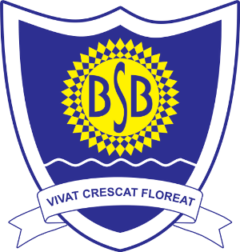Primary Overview
Primary School
The Primary school follows a combination of the Cambridge Primary Curriculum for English, Mathematics, and Science, and the National Curriculum of England and Wales for History, Geography, Design and Technology, Personal, Social and Health Education, Art, Music, ICT, and PE.
Our textbooks vary, with Collins International Primary English as our core English text and workbook, complemented by the Nelson and Global English text and workbooks for the support learners. For Math, we use Abacus Active Learn as an online site, supported by the Abacus Primary Learn Math text and workbooks. Collins İnternational Primary Books are used for science, geography, and history lessons. Teachers also use the Social and Emotional Aspects of Learning (SEAL) books to promote PHSE lessons.
Careful planning by class teachers, teacher assistants, support teachers, and specialist teachers is constructed by all stakeholders involved. The planning templates are structured to reflect those in the United Kingdom and are checked weekly by the Deputy Principal. Strands that connect each subject are worked out so that the curriculum is delivered holistically.
Facilities
Primary school is equipped with facilities to cater for Art, Music, PE, and ICT. All classrooms are fitted with an interactive whiteboard and projector, which allows for interactive programs used for teaching and learning.
Classrooms have modern tables and chairs with lockers and cubicles for the pupils to store their bags, books, and other equipment. We also have a large range of text and workbooks used in the classrooms for various subjects, all of which come from the UK.
The Primary school has a large range of effective resources to assist the learning process. The school also provides stationery required in the classroom.
Home and School
All learners have Homework Diaries allowing messages to be transferred to parents and caregivers. Besides, we use an online managerial system to link further with parents. Each week a ‘Curriculum Contact’ form is sent out, giving parents the opportunity of viewing the work planned for the coming week. All teachers use the Class Dojo system, which enables parents to receive added information. We also send a Reading Record Book home each day with a record book their children are reading.
At the beginning of the academic year, we have an orientation evening where parents are introduced to the teacher and the teaching methods, behavior management system, and the like.
In the following terms, there are also meetings between parents and teachers to discuss the reports. We also have open mornings where parents are invited to spend some time in the classroom to watch the teaching and learning taking place.
Besides, parents are invited to the school during the year, for example, for Science Day, the December Concert, Nowruz Concert, BSB Bazaar, etc. The PTA is another crucial area where parents can become involved in the school, and we invite parents to join.
Assessments
Both home and school need to know how successfully pupils have learned within our curriculum.
Our assessment program has been modified to incorporate both the Cambridge Primary Curriculum and the Cambridge Curriculum used in the Secondary School and the National Curriculum for England and Wales for the foundation subjects.
All teaching staff members regularly assess pupils through formal and informal methods, such as Spelling tests and Mental Mathematics tests, summative assessments, formative assessments, peer assessments, and the like. Besides, teachers keep up-to-date records of these assessments and anecdotal notes on all pupils’ classes.
Progression Tests
In the Autumn and Spring terms, internally designed end-of-term assessments cover the work learned in that term in English, Mathematics, and Science. In the final term of the academic year, the summer term, pupils complete English, Mathematics, and Science Progression Tests allocated by the University of Cambridge. These are marked internally and are compulsory for all pupils from Years 3 to Year 6.
Check Point Assessments
In addition to the Progression Tests, all Year 6 pupils complete an externally marked Cambridge assessment. These Check Point assessments cover the curriculum learned for the year in English, Mathematics, and Science. These assessments take place in April, and the results are sent back to the school once they have been marked. The pupils receive a certificate to show that they have completed their Primary School years and may proceed to Secondary school.
KS1 and Reception Assessment
Pupils in KS1 classes are assessed in English and Mathematics using internally designed assessments. Reception pupils are not assessed; however, notes regarding their progress and learner profiles record their progress.
Reports
Reports are one of the most important ways educational institutions can communicate how they are doing in their academic careers. BSB reports are no exception and have been designed to give the utmost information about the pupil’s progress.
KS1 and KS2 reports
These reports are given out three times per year after each end-of-term assessment. We use a grading system based on the Cambridge Primary Curriculum and use – and + symbols to demarcate levels further. The grading system is for the subjects in which the pupils have been assessed in. Please note that C-, C and C+ are all perfectly acceptable marks for pupils and denote that they function on a corresponding level with most learners in the United Kingdom. Additionally, we have an Effort section which is carefully described in the report. This shows how the pupil has applied themselves during that particular term.
Reception Reports
These reports do not have grades since these learners do not do formal assessments. Their reports consist of anecdotal notes in the following Prime Areas; Communication & Language, Physical Development and Personal, Social & Emotional. Added to this, in-depth comments are recorded in the Specific Areas of English, Mathematics, Expressive Arts & Design, and Understanding the World.
